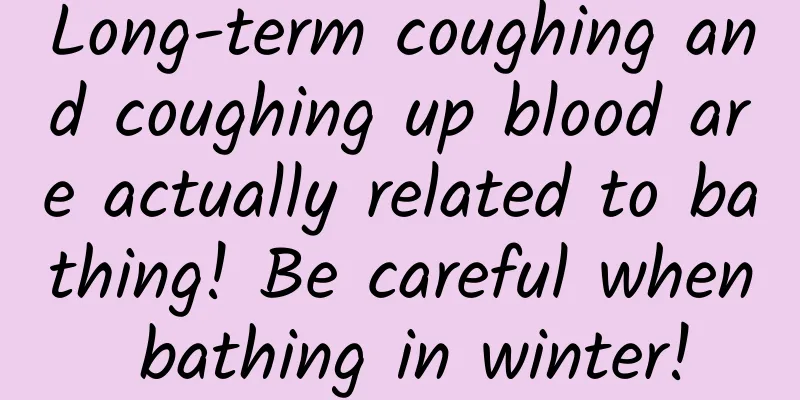Long-term coughing and coughing up blood are actually related to bathing! Be careful when bathing in winter!

|
Review expert: Peng Guoqiu, deputy chief physician of the Fourth Medical Center of the General Hospital of the Chinese People's Liberation Army As the weather gets colder, taking a warm bath has become a must for many people. However, such a thing that makes people feel comfortable and happy may also cause harm to our bodies. Long-term coughing and bleeding, it turned out that taking a bath caused the trouble Ms. Li, who lives in Hangzhou, has a very strict diet. Although she has a slender figure, her nutrition is unbalanced, which has led to a significant decline in her immunity. For three or four years, she has been tormented by coughs. Due to long-term coughing, sputum, and hemoptysis, Ms. Li suspected that she had tuberculosis. After further examination at the hospital, she was diagnosed with nontuberculous mycobacterium pulmonary disease (NTM pulmonary disease). After further examination, it was identified as nontuberculous mycobacterium-avian Mycobacterium infection. After treatment, Ms. Li's condition improved, but a year later, she began to cough again and her sputum was stained with blood. She came to the hospital for examination again and was diagnosed with a recurrence of nontuberculous mycobacterium pulmonary disease (NTM pulmonary disease), which was still Mycobacterium avian. Ms. Li said that she likes to take hot showers very much. She would wait for a long time for the hot water to fill the bathroom with mist before taking a shower. She has not changed her shower head for more than 10 years! The doctor said that this may be the reason why Ms. Li had repeated infections. So what exactly is Mycobacterium avium? And what does it have to do with bathing? Does this mean that bathing is no longer an option in winter? Nontuberculous mycobacteria - Mycobacterium avium Nontuberculous mycobacteria (NTM) are a large group of mycobacteria other than Mycobacterium tuberculosis and Mycobacterium leprae. They mainly affect the lungs and can cause chronic inflammation, lung tissue damage, and in severe cases affect respiratory function. Mycobacterium avium is a member of the avian intracellular Mycobacterium complex and is generally carried in the environment of birds, but it is also widely present in natural environments such as water and soil. It is a conditional pathogen that is mainly transmitted through the respiratory tract and can also cause acute or chronic infections through skin wounds, the digestive tract, damaged skin and mucous membranes, and other sites. Mycobacterium avium Mycobacterium avium can exist for a long time in the pipes of urban water supply systems and can also parasitize on bathroom shower heads. In addition, shower heads are often damp, dark, and warm, which further promotes the growth of Mycobacterium avium. If inhaled by immunocompromised patients, it will lead to lung colonization and disease. Mycobacterium avium complex (MAC) infection of cavities and spaces in the lungs In addition, Mycobacterium avium is naturally resistant to many antibiotics and anti-tuberculosis drugs and requires combined treatment with multiple antibiotics. It is very easy to misdiagnose or miss the diagnosis, so these people should be careful As we mentioned earlier, avian Mycobacterium can be transmitted in many ways, not limited to the respiratory tract. It can also enter the human body through skin wounds, the digestive tract, and damaged skin and mucous membranes, causing acute or chronic infections. Once infected, it may not only cause discomfort such as coughing, sputum, chest tightness, joint pain, etc., but may also affect the lungs, causing lung tissue damage, and in severe cases even affecting respiratory function. In addition, the infection caused by this bacteria often occurs in the lungs, and the related symptoms are very similar to those of tuberculosis, but the onset is more hidden, lacking specific imaging manifestations, and is easily missed and misdiagnosed, making treatment more difficult. If you have repeated coughing, coughing up blood, etc., you can't think of "long-term illness makes you a doctor yourself", you must go to the hospital for a formal examination! And these people should pay more attention! 1. People who already suffer from chronic obstructive pulmonary disease 2. People with primary immunodeficiency diseases 3. Patients with autoimmune diseases such as rheumatoid arthritis 4. People with a history of tuberculosis or abnormal lung structure 5. The elderly It is very easy to misdiagnose or miss the diagnosis, so these people should be careful Mycobacterium avium infection is indeed terrible, but does that mean we can't take a bath in winter? Replace shower heads regularly and consider taking a bath Replace the shower head regularly and descale it every three months or so by adding clean water to white vinegar in a 1:1 ratio, soak the shower head for 3 hours, and then rinse it clean. People with poor immunity can consider taking a bath in a tub, which can also help reduce the inhalation of microbial aerosols and reduce the risk of infection during bathing. The water temperature should not be too high, and the body and bathroom should be preheated If the bath water temperature is too high, it may aggravate dry skin and increase the burden on the heart. It is more appropriate to keep the water temperature at 38℃-40℃ in winter. In winter, the temperature difference between indoor and bathroom is large. Before bathing, you can warm up your body by stepping on the spot, twisting your waist, and rubbing your feet. You can also turn on the bathroom heater a few minutes in advance to preheat the bathroom. Shorten the bathing time and take a bath in a reasonable order Taking a bath for too long will cause the sympathetic nerves to be excited for a long time, increase the heart rate and blood pressure, and increase the burden on the heart. It is also easy to damage the skin barrier function. When the weather is cold, the recommended order of bathing is face, hands and feet - body - head. Because of the cold weather, the blood pressure changes greatly before and after bathing, which can easily cause stroke. Taking a bath is a relaxing and pleasant thing, but don't let bad habits bring misfortune to happiness~ Note: The cover image is a copyrighted image. Reprinting it may cause copyright disputes. |
<<: Carbon dioxide: You can conquer it with shellfish! Can shellfish farming also fix carbon?
Recommend
Is your Apple phone outdated? iOS 15 is coming this year, and these devices are not supported
When it comes to system support for older phones,...
After using melatonin, it will be dark when I close my eyes? NO!
Author: Zang Juxiang, Chief Pharmacist of Eastern...
[Creative Cultivation Program] The "Growth History" of a Little Strawberry
When it comes to strawberries, everyone should be...
A ranking of 6 common iron-rich foods. I never thought that the "king" would be this one!
When it comes to "iron and blood supplements...
What is the Juliang Qianchuan advertising platform? How to advertise on TikTok?
Douyin began to enter the e-commerce field in an ...
Is the customization cost of Aba Geotechnical Building Materials Mini Program high? Aba Geotechnical Building Materials Mini Program Customization Cost List
The factors affecting the quotation of Aba Geotec...
Tips and precautions for placing Tik Tok information flow ads!
As an emerging advertising model, information flo...
Brand promotion: Lixia marketing copywriting creativity is here!
This issue mainly brings you some marketing direc...
iOS vs Android: Will Apple repeat the mistakes of its PC business?
Since its birth, the iPhone has attracted countle...
“Zhuan Zhuan” surpasses “Xianyu” against all odds, you have to read these growth strategies!
Zhuan Zhuan and Xianyu are both C2C second-hand t...
Behind the skyrocketing memory prices is an endless war you can’t see
On February 3, 2012, Steve Appleton, CEO of Micro...
Do you really understand the world of "second dimension"? There is huge economic value hidden there.
It is said that the world of the second dimension...
Android version split, developers don't need to worry too much
[[127176]] Recently, Google released a distributi...
Don’t take this kind of voice lightly! Some people are tortured every day…
Compiled by: Gong Zixin Do you live near the airp...
A drunk man slept in this position all night, and when he woke up he was sent directly to the ICU and had "magic lungs"...
On the morning of March 26, a 31-year-old man was...









